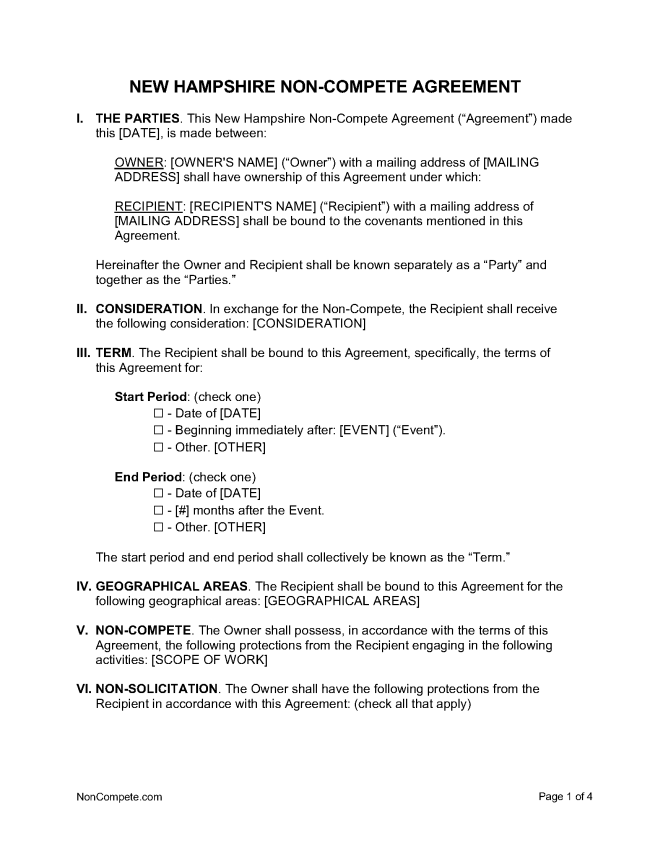A New Hampshire non-compete agreement is a contractual restraint that prevents an employee from working in a particular field, or an entrepreneur from operating a particular type of business. Although restraints of trade are disfavored in New Hampshire, they can be enforced, and relative to other states, it imposes an average level of scrutiny.
Unlike most states, New Hampshire does have some statutory requirements about non-competes being in writing.
Table of Contents |
Are Non-Competes Enforceable in New Hampshire?
Yes, non-competes are enforceable if they are reasonable, meaning it
- Is no greater than necessary to protect the employer’s legitimate interest;
- Does not impose an undue hardship on the employee; and
- Does not harm the public interest.
Concord Orthopaedics Pro. Ass’n v. Forbes (1997).
Formalities
If an employer requires a non-compete agreement as a condition of an employee beginning to work at a company, the agreement must be provided in advance. If the agreement is not disclosed, it is not enforceable. N.H. Rev. Stat. Ann. § 275:70
Legitimate Business Interest
Retaining employees is not a protectable interest. Business interests that may be legitimately protected by a New Hampshire non-compete agreement include:
- Trade secrets communicated to the employee while employed by the company;
- Business information that is confidential but does not meet the definition of a trade secret, such as information on a unique business method;
- Special influence over customers that was acquired while the employee was with the company;
- Contacts acquired while with the company; and
- The good will and positive image of the former employer’s business.
(Nat’l Emp. Serv. Corp. v. Olsten Staffing Serv., Inc. (2000)
Sale of Business vs. Employment Contract
A non-compete agreement that is ancillary to the sale of a business will be interpreted more liberally than a non-compete agreement in an employment contract. (Centorr-Vacuum Indus., Inc. v. Lavoie (1992)).
Scope of Restraint
Non-compete agreements cannot extend beyond the covered employee’s sphere of influence, meaning that they cannot cover a territory broader than the one the employee worked in, or beyond the clients that the employee developed a relationship with while employed. (Merrimack Valley Wood Prod., Inc. v. Near (2005)).
In the case of employees working in sales, this typically means limiting non-competes to the territory or territories in which the employee worked. (Tech. Aid Corp. v. Allen (1991)).
Prohibited Workers
Non-competes are not valid against an employee who earns an hourly rate less than or equal to 200 percent of the federal minimum wage. N.H. Rev. Stat. Ann. § 275:70-a
Attorneys cannot be a party to an agreement that limits their ability to represent clients in the future, whether that agreement is contained in an employment contract (Rule 5.6(a), New Hampshire Rules of Professional Conduct) or a case settlement (Rule 5.6(b), New Hampshire Rules of Professional Conduct).
Terminating an Employee
Non-competes may be enforceable against an employee who has been terminated, but if the employer breaches a material portion of the contract, then it becomes unenforceable. (Laconia Clinic, Inc. v. Cullen (1979)).
Burden of Proof
New Hampshire courts have not decided which party has the burden of proof in cases involving non-compete agreements. However, the party seeking to enforce a non-compete agreement typically has the burden of proving that it meets the state’s requirements.
Continued Employment (consideration)
Continued employment is adequate consideration to enforce a non-compete agreement. (Smith, Batchelder & Rugg v. Foster (1979))
Maximum Term
There is no maximum term for non-competes in New Hampshire. Instead, courts consider how long an agreement can last based on other elements of the restraint.
Recently, agreements lasting two years or less have been more commonly found reasonable. ACAS Acquisitions (Precitech) Inc. v. Hobert (2007).
But in Moore v. Dover Veterinary Hosp., Inc. (1976), the sate Supreme Court upheld a five-year restriction covering a 20-mile area because of the close connections between the veterinary practice and a community.
Blue Penciling (allowed)
Courts appear to have the ability to reform or “blue pencil” non-compete agreements. In Smith, Batchelder & Rugg v. Foster (1979), the New Hampshire Supreme Court held that if a non-compete agreement is deemed unreasonable, a court can modify or partially enforce the agreement if the employer can prove that it acted in good faith during the process.
However, courts are limited in the modifications they can make. In Gosselin v. Archibald (1981), the state’s high court held that unless the agreement is ambiguous, or there is evidence that the parties intended to modify it, a court cannot extend a non-compete agreement to help enforce a violation.
